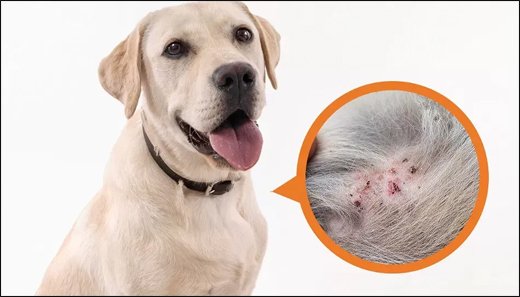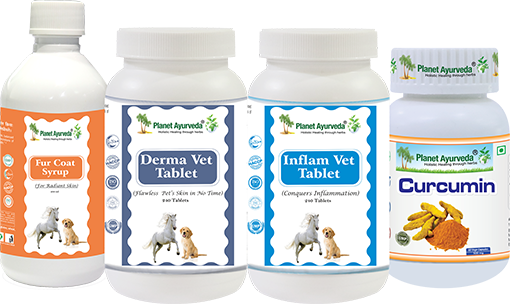Natural Ayurvedic Remedies for Folliculitis in Dogs – Symptoms, Causes & Effective Herbal Solutions
Abstract
Folliculitis in dogs is a common dermatological condition characterized by inflammation and infection of hair follicles, leading to symptoms such as pustules, redness, and hair loss. The epidemiology of folliculitis in dogs varies based on factors such as breed, age, underlying health conditions, and environmental exposures. Dogs with conditions such as atopic dermatitis, allergies, or hypothyroidism are also at higher risk. Studies suggest that up to 30% of dogs with dermatological issues may suffer from bacterial folliculitis, with certain breeds like German Shepherds, Bulldogs, and Dachshunds being more predisposed due to genetic or anatomical factors. While folliculitis in dogs can be treated effectively, it’s important to catch it early and get the right treatment to avoid it coming back again and again. Understanding the causes, symptoms, and treatment options for folliculitis is crucial for maintaining a dog’s skin health and overall well-being.

Introduction
Folliculitis in dogs is a common skin issue where the hair follicles become inflamed and infected, often causing irritation. It typically manifests as red, swollen bumps or pustules on the skin, often accompanied by itching, hair loss, and discomfort. The condition can be caused by a variety of factors, including bacterial infections, fungal overgrowth, parasites, allergies, or underlying health issues like hypothyroidism or autoimmune disorders. Folliculitis can affect dogs of all ages and breeds, although some may be more prone due to genetic factors or environmental conditions. Early diagnosis and treatment are essential to manage the condition and prevent it from becoming chronic, as untreated folliculitis can lead to further skin damage or infections.
Causes of Folliculitis in Dogs
Folliculitis in dogs can be caused by several factors, often involving a combination of external and internal issues that make the skin more vulnerable to infection. Some of the most common causes include:
- Bacterial Infections: Most commonly caused by Staphylococcus bacteria.
- Yeast Infections: Overgrowth of Malassezia yeast, often due to allergies or moisture.
- Parasites: Fleas, mites, and ticks can introduce pathogens or irritate the skin.
- Allergies: Food or environmental allergies leading to skin irritation and secondary infections.
- Hormonal Imbalances: Conditions like hypothyroidism or Cushing’s disease weaken the immune system.
- Trauma or Injury: Scratching, biting, or rubbing the skin can cause infection.
- Poor Grooming or Hygiene: Accumulation of dirt, oils, and bacteria on the skin.
- Underlying Health Issues: Weakened immune systems due to age, illness, or medication.
Types of Folliculitis in Dogs
There are several types of folliculitis in dogs, each with different causes and characteristics:
1. Bacterial Folliculitis
- Caused by bacterial infection, most commonly Staphylococcus bacteria.
- Characterized by red, swollen pustules or bumps around the hair follicle.
2. Pyotraumatic Folliculitis (Hot Spots)
- Often triggered by self-trauma, such as scratching or licking due to itching.
- Can appear suddenly as moist, inflamed patches of skin, typically in areas like the back or neck.
3. Yeast Folliculitis
- Caused by an overgrowth of Malassezia yeast, commonly seen in dogs with allergies or skin folds.
- Symptoms include greasy, smelly skin, and reddened, inflamed hair follicles, often with scaling.
4. Demodectic Folliculitis
- Caused by an overgrowth of Demodex mites, which normally live on the dog’s skin without causing harm.
- Common in dogs with weakened immune systems, it often results in hair loss, red patches, and scabs.
5. Fungal Folliculitis
- Caused by fungal infections, such as ringworm or dermatophytes.
- Can lead to hair loss, circular patches of scaling, and inflammation around hair follicles.
6. Allergic Folliculitis
- Triggered by allergies (food, environmental, or flea allergy dermatitis).
- Can lead to inflammation, itching, and the formation of pustules around hair follicles, often leading to secondary bacterial infections.
Symptoms of Folliculitis in Dogs
The symptoms of folliculitis in dogs can vary depending on the severity and cause of the condition, but common signs include:
- Red, inflamed skin around hair follicles
- Pustules or bumps on the skin
- Hair loss in affected areas
- Itching or scratching due to discomfort
- Scabs or crusts on the skin
- Unpleasant odor from secondary infections
- Swelling or raised nodules in severe cases
- Pain or sensitivity when touched
- Discharge (pus or fluid) from pustules
Diagnosis of Folliculitis in Dogs
The diagnosis of folliculitis in dogs typically involves several steps to identify the underlying cause and confirm the condition:
- Physical Examination: Inspection of the skin for signs like pustules, redness, and hair loss
- Skin Scraping: To check for parasites (e.g., mites) or collect bacteria for culture
- Cytology: Microscopic examination of pustule or lesion samples to identify bacteria, yeast, or inflammatory cells
- Skin Culture: To identify specific bacteria or yeast causing the infection
- Fungal Culture: If a fungal infection (e.g., ringworm) is suspected
- Blood Tests: To check for underlying health issues (e.g., hypothyroidism or Cushing’s disease)
- Allergy Testing: To identify potential environmental or food allergens if allergies are suspected
Preventive Steps of Folliculitis in Dogs
By following the preventive steps, the risk of folliculitis and other skin issues can be minimized, promoting healthier skin for the dog.
- Keep the coat clean and free of tangles
- Use gentle, dog-safe shampoo
- Use flea, tick, and mite control measures
- Ensure a balanced diet for immune support
- Manage food and environmental allergies
- Keep the skin dry, especially in folds
- Clean and treat cuts or injury
Management
Steps to manage folliculitis in dogs involve:
- Medications
- Antibiotics
- Antifungal
- Anti-inflammatory drugs (corticosteroids and antihistamines)
- Medicated Shampoos
- Shampoos with Chlorhexidine, Miconazole, or Ketoconazole
- Probiotics or supplements to support immune system
Ayurvedic Aspect
Ayurveda offers a natural, holistic approach to health for both humans and animals. By focusing on balance, natural healing, and prevention, it can promote long-term wellness. It emphasizes balance in the body, mind, and spirit, and uses natural remedies like herbs, diet, and lifestyle practices to promote health and prevent disease. Like with humans, Ayurveda for animals helps prevent health problems, keeps them feeling their best, and naturally treats any specific issues they may have. Pashu ayurveda is a branch of ayurveda that focuses on maintaining animals’ health and well-being. In Ayurveda, folliculitis in dogs is seen as an imbalance in the body’s natural doshas (vata, pitta and kapha), often due to an excess of pitta or kapha in the skin. An aggravated pitta causes inflammation, redness, and irritation in the skin, leading to pustules and infections. Meanwhile, an excess of kapha leads to clogged hair follicles, promoting bacterial or fungal growth. Ayurveda manages this by restoring dosha balance with herbal remedies, dietary adjustments, and lifestyle changes, aiming to reduce inflammation, support skin health, and prevent recurrence.
Ayurvedic herbs that can be used in the managements of folliculitis in dogs involves:
- Neem (Azadirachta indica): Antibacterial, antifungal, and anti-inflammatory, helps treat skin infections.
- Turmeric (Curcuma longa): Reduces inflammation and promotes skin healing.
- Aloe Vera (Aloe barbadensis miller): Soothes and cools irritated skin, relieves itching.
- Tulsi (Ocimum sanctum): Antimicrobial, supports immune health and prevents infections.
- Manjistha (Rubia cordifolia): Blood purifier, reduces inflammation and promotes skin health.
- Giloy (Tinospora cordifolia): Boosts immunity and helps combat infections.
- Coconut Oil (Cocos nucifera): Antifungal, antibacterial, and soothing for the skin.
- Chandan (Santalum album): Cooling properties, reduces inflammation and irritation.
- Ashwagandha (Withania somnifera): Reduces stress and supports overall skin health.
Herbal Remedies for Folliculitis in Dogs by Planet Ayurveda
Planet Ayurveda offers a range of natural herbal products specifically designed to treat folliculitis in dogs. Their products, including DermaVet Tablets, FurCoat Syrup, InflamVet Tablets, and Curcumin Capsules, are crafted using time-tested, pure, and potent ayurvedic herbs. These products are free from harmful chemicals and are made with all-natural ingredients. Planet Ayurveda focuses on providing safe and effective solutions that support the body’s natural healing process while promoting overall wellness for pets.
Product Description
1. Derma Vet Tablet
DermaVet tablets are specifically formulated to address skin conditions like folliculitis in dogs, combining the powerful properties of herbs like Haridra (Curcuma longa) and Neem (Azadirachta indica). These ingredients are well-known for their healing, anti-inflammatory, and antimicrobial benefits, making them highly effective in managing skin infections and promoting healthy skin. Together these herbs work synergistically to treat folliculitis by addressing both the symptoms (inflammation, infection, itching) and the underlying causes (bacterial or fungal growth, toxin buildup). These capsules provide a natural and effective remedy for dogs dealing with folliculitis.
Dosage : 2 tablets, two times a day.
2. Fur Coat Syrup
This syrup is a herbal formulation designed to support skin health in dogs, especially in managing conditions like folliculitis. It contains key ingredients such as Sariva (Hemidesmus indicus) and Haridra (Curcuma longa), both of which offer significant benefits in treating skin-related issues. Together, these ingredients work synergistically to improve skin health, reduce inflammation, and address the underlying causes of folliculitis, providing relief from itching, redness, and discomfort. This syrup also supports overall immune function, helping your dog recover more effectively from skin conditions and preventing further flare-ups.
Dosage : 10 ml, two times a day.
3. Inflam Vet Tablet
These tablets are formulated with powerful Ayurvedic herbs like Shallaki (Boswellia serrata) and Guggul (Commiphora mukul), which are commonly used for their anti-inflammatory and healing properties. Together, these herbs help soothe irritated skin, promote healing, and prevent the recurrence of skin conditions in dogs, improving overall skin health and well-being. These capsules reduce inflammation and pain, making it effective in managing conditions like folliculitis in dogs.
Dosage : 2 tablets, two times a day.
4. Curcumin Capsules
These capsules are derived from Haridra (Curcuma longa). Curcumin is well-known for its potent anti-inflammatory, antioxidant, and antimicrobial properties. When used in dogs, curcumin helps manage conditions like folliculitis by reducing inflammation and promoting healing in the skin. Regular use of these capsules can help manage chronic skin conditions, promote healthier skin, and reduce symptoms of itching, redness, and swelling associated with folliculitis in dogs.
Dosage : 1 capsule, two times a day.
Conclusion
In this article we have concluded about folliculitis in dogs. We discussed its causes, types, symptoms, diagnosis, preventive steps, management, ayurvedic aspect and herbal remedies by planet ayurveda. Folliculitis in dogs is a common yet treatable skin condition that can be managed effectively through natural remedies. With prompt diagnosis, proper treatment, and a focus on prevention, Ayurveda can help keep your dog’s skin healthy and free from recurring issues.




